It the midst of ‘narrow-minded, harsh unfriendly steps taken by Premier Abe
President Moon Jae-in made some nice words about Japan on the Liberation Day of Korea from Japan on Aug. 15, 2019. This was sheer surprise to many Koreans, if not all of them, because most had Koreans had anticipated some scathing criticisms against Japan as Prime Minister Shintaro Abe had continued bringing heavy pressure on Korean-Japanese relations cutting off Japan’s sale of key electronic and other parts and components which Samsung and other major Korean Jaebeol companies were importing almost entirely relying on imports from Japan.
Some Koreans even called Prime Minister Abe’s acts, Abe Chisa Hada! It meant, “Abe is really playing low!”.
The Liberation Day of Korea on August 15 is a day when Korea was liberated from Japan after forced slavery from them for the duration of 36 years.
As was mentioned at the beginning, Moon made remarks that were far from criticism against Japan.
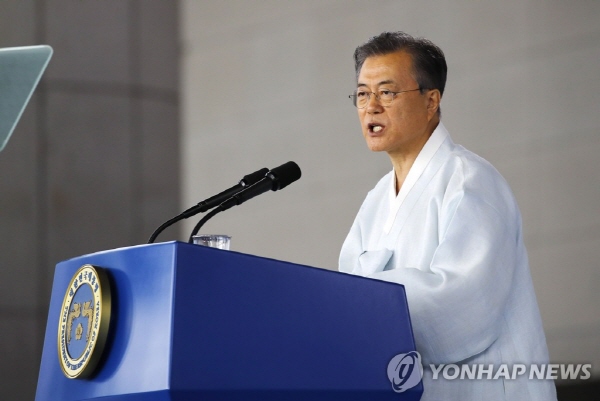
Moon said: “We have not dwelt on the past. Instead, we continued to engage in security and economic cooperation with Japan. Together with Japan, we have tried to practically assuage the suffering of victims from the Japanese colonial period. We have consistently maintained the position that we should learn from history and steadily work together.
Then he continued: “Reflecting on the past does not mean clinging to the past but overcoming what had happened and moving toward the future. We hope that Japan will play a leading role together in facilitating peace and prosperity in East Asia while it contemplates a past that brought misfortune to its neighboring countries.
“Only when we work together will we be able to achieve joint growth that is sustainable. The world has achieved common prosperity through a highly sophisticated division of labor. Japan has made progress by engaging in the division of labor upon the platform of the free trade order as well.
“Within the international division of labor, if any country weaponizes a sector where it has a comparative advantage, the peaceful free trade order will inevitably suffer damages. A country that achieved growth first must not kick the ladder away while others are following in its footsteps.
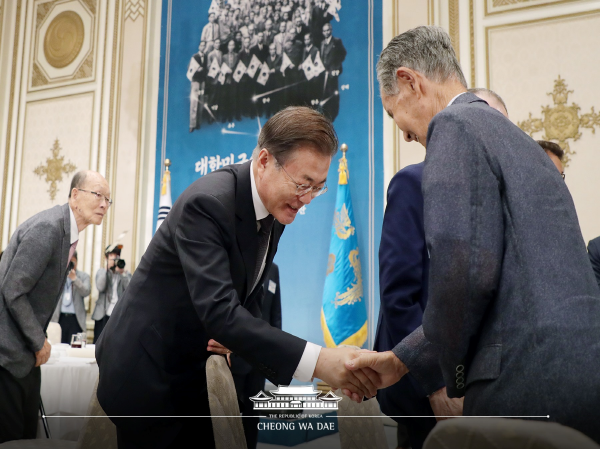
“Better late than never: if Japan chooses the path of dialogue and cooperation, we will gladly join hands. We will strive with Japan to create an East Asia that engages in fair trade and cooperation.”
Excerps from the Liberation Speech of President Moon follows:
Fellow Koreans, decorated patriots who dedicated themselves to the nation’s independence, their relatives and Korean compatriots abroad,
As we mark the centenary of both the March First Independence Movement and the founding of the Provisional Government of the Republic of Korea this year, I find it particularly meaningful to hold the ceremony commemorating the 74th Liberation Day here at the Independence Hall of Korea.
The Republic of Korea we see today was created by the indomitable spirit of our forefathers who fought for independence while refusing to buckle or give up in the face of any tribulation. Our patriotic forefathers gave their all, aspiring for “the day when Samgaksan Mountain would rise up and dance and the waters of the Hangang River would roll in its bed and soar”. Their passionate spirit lives on in the people’s hearts even at this very moment.
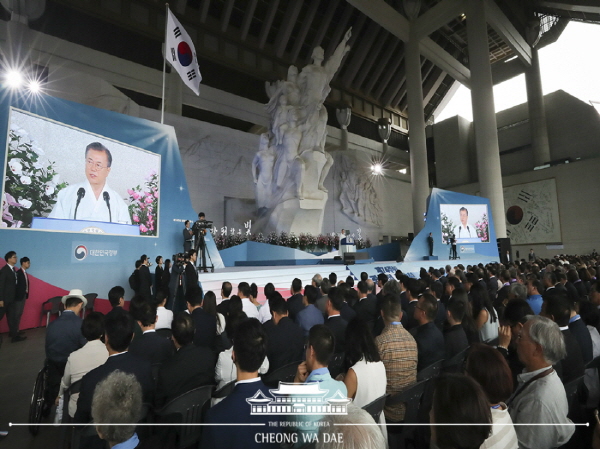
Today, I would like to convey my deepest respect to our independence activists and their bereaved families. At the same time, I would like to join with the people in envisioning the nation that our forefathers sought to build with exuberance on the day Korea was liberated, and the country that we aim to create by carrying on where they left off.
The country that we desire is one in which we all prosper together and where everyone is given a fair chance and can get back on their feet again even if they fail.
The country that we desire is one in which a girl from a small town on the southwestern island of Wando can study hydrogen industry in the southeastern city of Ulsan, start a business in the northwestern city of Nampo and help export eco-friendly cars to Mongolia and Siberia. It is a country where a boy raised in the northeastern city of Hoeryeong can graduate from a maritime school in the southeastern port city of Busan and become a navigator aboard a container ship that sails to the ASEAN region, the Indian Ocean and all the way to Chile in South America. It is also a country where a young man who majors in agriculture can grow soybeans on a massive scale along the Amur River together with farmers from South and North Korea as well as Russia and where his younger brother can raise cattle in the West Coast city of Seosan that feed on these soybeans.
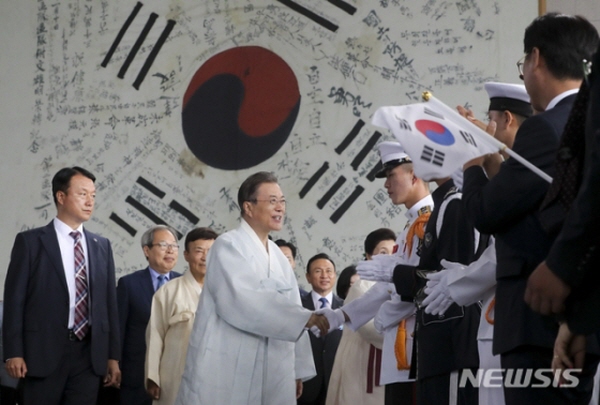
Ignite the furnace, This is a country that expands our lives and imagination beyond the Dumangang River onto the continent, and across the Pacific to the ASEAN region and India. This is a country that cooperates and prospers with its neighboring countries, going beyond the limited scope of economic activities within the southern half of the Korean Peninsula.
Let us extract wires, extend steel bars and flatten iron plates upon the heart of a new nation,
Upon the foundation of cement, steel and hope
Let us build a new nation that will not be shaken
Shortly after Korea gained independence, a poet sang out this dream of a newly liberated nation.
A new nation that cannot be shaken: It was the legitimate dream of a newly independent country that threw off the shackles of foreign invasion and rule.
Now, after 74 years have passed, Korea has proudly become an economic powerhouse renowned as the world’s sixth-largest manufacturer and exporter. It has embarked on the era of per capita income of 30,000 USD and is on the road to becoming a country of thriving culture, which was the dream of independence activist Kim Gu.
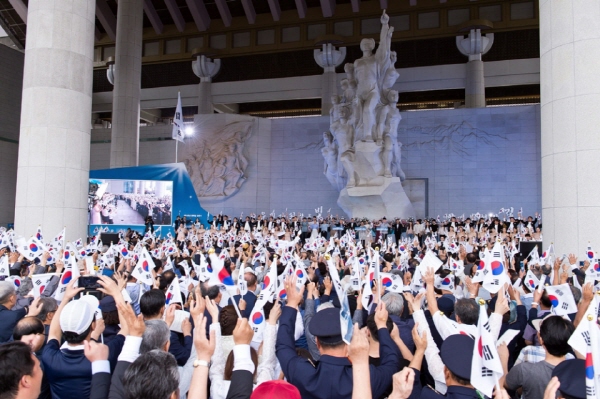
Today, I renew my commitment to meeting the aspirations of the people to build an unshakable nation by reminding myself of our people who have demonstrated remarkable resilience in the face of a series of crises.However, we have yet to become an unshakable nation. That is because we still lack sufficient strength and remain divided.
My fellow Koreans,
Upon the foundation of a free-trade order, we were able to focus on those industries in which we could excel: semiconductors, IT and biotechnology among others. Within the framework of the international division of labor, all countries were able to dream of success by harnessing their respective strengths.
East Asia had lagged behind in the process of modernization, but once again rose to achieve economic development through the division of labor and collaboration. The world described it as the ‘East Asian Miracle’.
Although there have been periods of aggression and conflict, East Asia is steeped in a history of exchanges and trade that stretches much further back. From the Bronze Age through civilizations up to modern times, East Asia has engaged in mutual dissemination and sharing. Some of the oldest cases of exchanges and cooperation in human history have taken place in this region, and the advance in civilization has been achieved together.
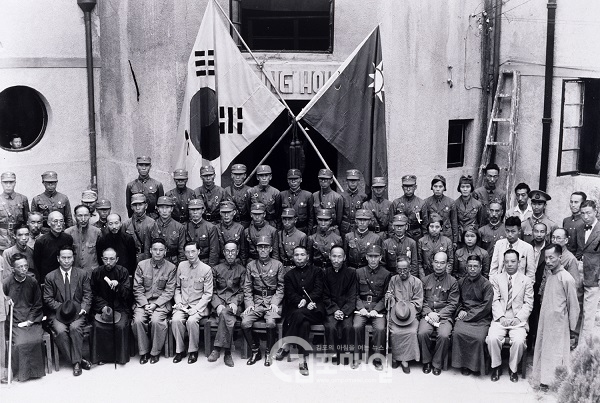
Liberation was not just a cause for celebration for us alone. It was a day that marked the end of longstanding wars that had raged for over 60 years, including the First Sino-Japanese War, the Russo-Japanese War, the Manchurian Incident, the Second Sino-Japanese War and the Pacific War. It was also the day of liberation for East Asia. The Japanese people were also able to cast off the yoke of imperialistic oppression and were liberated from wars of aggression.
We have not dwelt on the past. Instead, we continued to engage in security and economic cooperation with Japan. Together with Japan, we have tried to practically assuage the suffering of victims from the Japanese colonial period. We have consistently maintained the position that we should learn from history and steadily work together.
Reflecting on the past does not mean clinging to the past but overcoming what had happened and moving toward the future. We hope that Japan will play a leading role together in facilitating peace and prosperity in East Asia while it contemplates a past that brought misfortune to its neighboring countries.
Only when we work together will we be able to achieve joint growth that is sustainable. The world has achieved common prosperity through a highly sophisticated division of labor. Japan has made progress by engaging in the division of labor upon the platform of the free trade order as well.
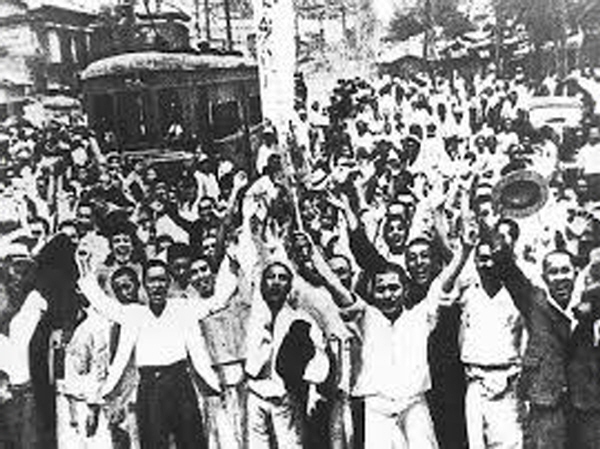
Within the international division of labor, if any country weaponizes a sector where it has a comparative advantage, the peaceful free trade order will inevitably suffer damages. A country that achieved growth first must not kick the ladder away while others are following in its footsteps.
Better late than never: if Japan chooses the path of dialogue and cooperation, we will gladly join hands. We will strive with Japan to create an East Asia that engages in fair trade and cooperation.
Following last year’s Pyeongchang Winter Olympics, the Tokyo Summer Olympics will be held next year while the Beijing Winter Olympics is slated for 2022. This will mark an unprecedented series of Olympics held in East Asia. It will be a golden opportunity for East Asia to solidify the framework of friendship and cooperation and to progress along the path toward common prosperity.
Just as people around the world witnessed a “Peaceful Korean Peninsula” at the Pyeongchang Olympics, I look forward to seeing the Tokyo Olympics become a source of hope for friendship and cooperation.
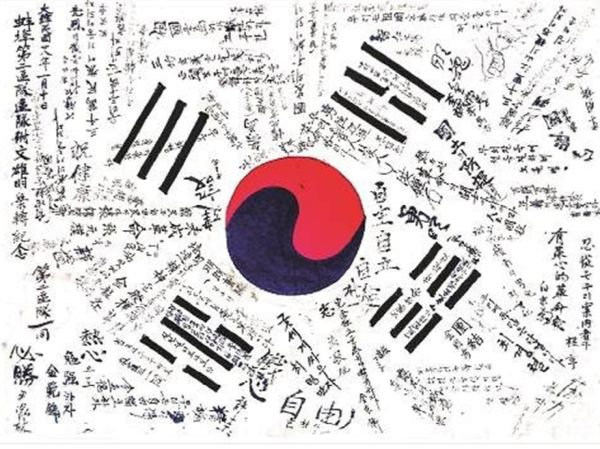
We will fulfill the responsibilities entrusted to us so that future generations in East Asia will be able to experience prosperity through cooperation.
My fellow Koreans,
Today, we are no longer what we were. The Republic of Korea today has grown stronger and more mature while surmounting countless challenges and tribulations.
I put forth today three objectives for “a nation that cannot be shaken” – the new Korean Peninsula that we are aspiring to build.
First, as a responsible economic powerhouse, we aim to uphold the free trade order and facilitate equitable cooperation in East Asia.
The miracle of economic development that Korea has achieved as well as the underlying strength can be shared with other countries, but they can never be taken away. When we retain a firm grip on our economic sovereignty, we will be able to stand firm as the master of our own destiny.
Unified strengths of the people have turned crises into opportunities, and challenges have helped our country emerge stronger and greater. Undaunted by the burning sands of the Middle East and the rough waves of the Pacific, we achieved economic growth. In succession, we successfully nurtured light industry, heavy and chemical industry and information and communication industry and have become a global IT powerhouse. Korea has now become a nation that leads 5G and other global technical standards.
Until recently, Korea has been playing catch-up on advanced countries, but now our economy is evolving into one that helps set the pace, taking on challenges ahead of other countries. In the face of Japan’s unwarranted export restrictions, we will continue our determined march toward a responsible economic powerhouse.
We will transform the structure of our economy into an ecosystem marked by inclusiveness and co-existence. We will also channel our efforts into enhancing the competitiveness of domestic materials, parts and equipment industries through mutually beneficial cooperation between SMEs and conglomerates as well as between labor and management. By encouraging scientists and engineers to take on new challenges and embracing unsuccessful attempts, we will build an economy that will never be shaken.
If we do not belittle ourselves and encourage each other even while reflecting on our own shortcomings, I believe we will be able to pull it off.
With a sense of responsibility befitting our economic strength, we will pursue broader cooperation and open up our markets even more and facilitate shared progress with neighboring countries.
Second, we aim to build a country that serves as a bridge by taking the lead in promoting peace and prosperity on the continent and out in the ocean.
In geopolitical terms, no other country in the world is surrounded by four major powers as we are. When Korea didn’t have much clout and was deemed insignificant, the Korean Peninsula was also cast to the periphery of the continent and ocean and was even reduced to an arena where global powers competed. This is the history that we had to endure.
However, if we build a strong nation, we will be able to play a leading role in upholding peace and prosperity in Northeast Asia, connecting the continent with the ocean. We must turn our country’s geopolitical position into a strength. We must establish a clear goal to take the initiative and not be pushed around by others anymore.
Cho So-ang, one of the founding members of the Provisional Government of the Republic of Korea long ago advocated for equality among individuals, peoples and nations. This defines Korea’s underlying spirit that is oriented toward peace and prosperity.
The Korean people's mature response to Japan's economic retaliation is also attributable to a distinctly mature public sentiment that does not want to see damages to the friendly ties between the people of Korea and Japan, even while mustering their determination to protect our economy. The people-centered community of peace and prosperity that my government seeks to build is all about promoting peace and prosperity on the entire Korean Peninsula first and then spreading them to East Asia and the whole world.
The New Northern Policy represents our aspiration to advance into the continent. We will expand the foundation for cooperation not only with China and Russia but also with Central Asia and Europe and lay a cornerstone for multilateral cooperation and security through the East Asian Railroad Community initiative.
The New Southern Policy encapsulates our ambition to navigate through the oceans. We will upgrade our relations with ASEAN and India to a level equivalent to those with our major neighboring countries and develop them into a cooperative relationship for common prosperity.
In November this year, the ASEAN-Republic of Korea Commemorative Summit and the inaugural Korea-Mekong Summit will be held in Busan. This will mark a milestone in the groundbreaking development of relations with ASEAN and the Mekong countries.
Connecting the severed railroads and roads between South and North Korea is the first step toward a country that serves as a bridge, which will spearhead the efforts to promote peace and prosperity in East Asia.
If Korea’s arteries for the passage of people and goods are reconnected all over the land, seas and skies of the Peninsula, and if the two Koreas are given free access in the continent and the ocean, the Korean Peninsula will emerge as a land of prosperity that connects Eurasia, the Pacific, ASEAN, and the Indian Ocean.
The Asian community will not be led by a single state but will instead become a community where diverse cooperation blossoms among countries on an equal footing.
Third, we aim to establish a peace economy in which prosperity is achieved through peace and also complete our liberation through the unification of the Peninsula.
By overcoming the division of the Peninsula, we must transform the Korean people’s energy into a driving force for future prosperity. The peace economy begins with the efforts to continue dialogue and cooperation so that North Korea can choose economic prosperity over nuclear program upon the foundation of complete denuclearization of the Korean Peninsula.
The two Koreas and the United States have engaged in dialogue for the past 20 months. In spite of a series of worrying actions taken by North Korea recently, the momentum for dialogue remains unshaken– which is a significant result of my government’s peace process on the Korean Peninsula. Compared to the past when the whole Peninsula experienced turbulence whenever North Korea engaged in provocation, the situation has definitely changed.
Even though numerous forces still exist at home and abroad that seek to stir up conflict, we have been able to come this far thanks to our people’s fervent desire for peace.
Following the meeting in June among the leaders of the two Koreas and the United States at Panmunjeom, North Korea and the United States are exploring working-level negotiations ahead of the third summit. This will probably constitute the most critical juncture in the entire process of achieving denuclearization and establishing peace on the Korean Peninsula. Now is the time for both Koreas and the United States to focus on resuming working-level negotiations between Pyongyang and Washington at the earliest possible date.
Even if there is a cause for dissatisfaction, making dialogue difficult by spoiling the mood or erecting barriers is by no means a desirable course of action. If there is dissatisfaction, it too should be raised and discussed at the negotiating table. I hope the people will also pull together to ensure that we can overcome the last hurdle in the dialogue process.
When we pass this hurdle, denuclearization of the Korean Peninsula will move closer and inter-Korean relations will also make significant strides. When economic cooperation accelerates and the peace economy begins, unification will beckon as stark reality before us someday.
According to IMF estimates, Korea will lead the Fourth Industrial Revolution and its GDP per capita will surpass 40,000 USD around year 2024.
In addition, if we combine the capabilities of the two Koreas, even while maintaining our respective political systems, it will be possible to create a unified market of 80 million people. Once the Korean Peninsula is unified, it is expected to become one of the six largest economies in the world. There have been research findings both at home and abroad that concludes that an era of GDP per capita of 70,000 to 80,000 USD will be possible around 2050.
It is clear that there will be enormous economic benefits from peace and unification. New markets and opportunities will open up for both South and North Korean businesses. Both Koreas will be able to reduce not only huge defense expenditures but also the invisible cost of the division, the so-called ‘Korea Discount’. We will also be able to find solutions to problems we currently face, such as low growth, low birth rate and an aging society.
However, the hopes and passions that will stoke the hearts of the people just as they did on that day of liberation will be more important than anything else. There can be no greater driving force for economic growth than hope and passion.
The East Sea Rim Economic Belt that starts in Busan and encompasses Ulsan, Pohang, Donghae, Gangneung, Sokcho, Wonsan, Najin and Seonbong will reach out to the continental economy through Vladivostok and to the maritime economy that connects the Northern Sea Route to Japan.
The Yellow Sea Rim Economic Belt that begins with Yeosu and Mokpo and includes Gunsan and Incheon and heads toward Haeju, Nampo and Sinuiju will help complete the grand economic strategy that looks toward China, ASEAN and India by nurturing the Blue Economy in Jeollanam-do; the new renewable energy industry around Saemangeum; and the high-tech industrial parks of the Gaeseong Industrial Complex, Nampo and Sinuiju.
North Korea has also shifted its national policy toward concentrating all of its efforts on economic development and is in the process of adopting market economy. The international community has also promised to assist its economic growth if it abandons its nuclear program.
Our intention is not to unilaterally assist North Korea. Rather, our intention is to promote mutual benefits for both Koreas and prosper together while guaranteeing the security of our respective regimes. The plan is for the two Koreas to contribute to the development of the global economy.
We will create new economic growth engines through the peace economy. We can no longer afford to let division consume our capacities. We will open the door to a new Korean Peninsula by pouring all we have into the peace economy.
This will be possible if South and North Korea join forces and commit themselves to decide the fate of the Korean Peninsula. When we overcome division, our liberation will finally be completed and Korea will become a country that cannot be shaken.
Some people express skepticism regarding the wisdom of talking up peace economy when North Korea is firing missiles. However, we possess defense capabilities that are even stronger. Although we are paying close attention and doing all we can to manage the situation to prevent the escalation of tension on the Korean Peninsula, the ultimate goal that these actions serve is dialogue, not confrontation. I hope these skeptics face up to the reality: the United States is continuing dialogue with North Korea without derailing while Japan is also seeking talks with Pyongyang. I hope these skeptics won’t remain prisoners to ideology.
The unified strength of people is essential. I ask the people to pull together as one.
Fellow Koreans, decorated independence fighters and their bereaved families, and Koreans overseas,
As we commemorate the Liberation Day today, I pledge to solidify denuclearization and peace regime on the Korean Peninsula during my term in office. I will initiate the peace economy upon this foundation and move toward unification.
We will advance dialogue and cooperation so that seeds sown together with North Korea in the spring of peace will grow into trees of prosperity.
I pledge to solidify the foundation so that we can successfully host the joint 2032 Seoul-Pyeongyang Olympics and stand tall in the world as one Korea by achieving peace and unification by 2045, which will mark the 100th anniversary of liberation.
It has been one hundred years since the Provisional Government declared the founding of a democratic republic named the Republic of Korea.
We have reflected on ourselves and matured over the past 100 years. We now have the confidence that we can prevail over any crisis. The people’s ability to achieve peace and prosperity on the Korean Peninsula has grown stronger. We can create a country that will not be shaken by anyone.
I remind myself of the words of independence activist Lee Seung-hoon, who goes by the pen name of Namkang:
“When seeds buried under the ground spring up and rise above the heavy soil, I have only seen them do this by themselves – never through the strength of others.”
The path that allows us to prevail over division and move toward peace and unification will be the royal road to becoming a responsible economic power. This is the road to overtaking Japan and guiding it toward a cooperative order in East Asia.
A new Korean Peninsula, one that will bring peace and prosperity to itself, East Asia and the world, awaits us.
We can do it!
Thank you.

